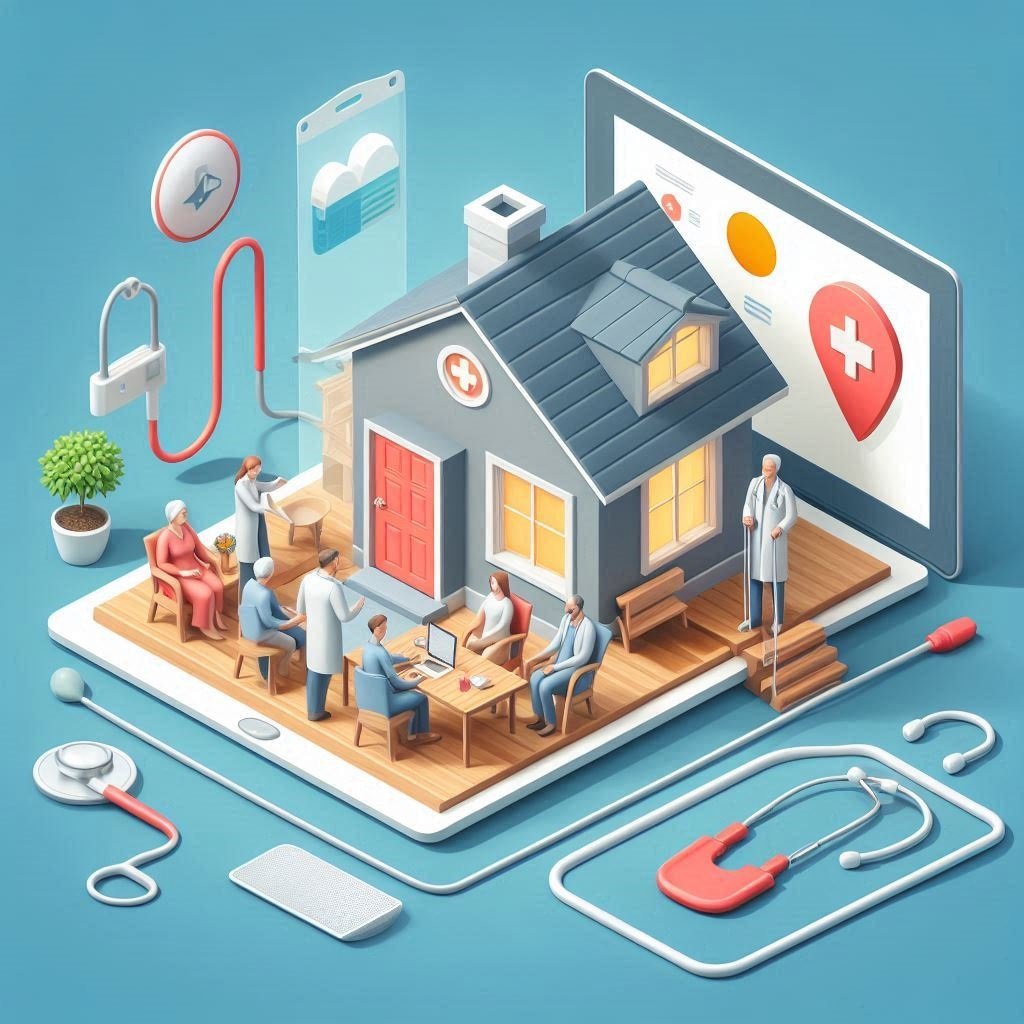Home healthcare is transforming the way we think about recovery and medical care. With advancements in medical technology and a shift towards patient-centered care, more people are choosing to heal in the comfort of their own homes. This trend is not only convenient but also offers numerous benefits for patients and their families. In this blog, we’ll explore what home healthcare is, its advantages, types of services available, and tips for making the most out of home healthcare services.
What is Home Healthcare?
Home healthcare refers to a wide range of health care services that can be provided in your home for an illness or injury. It is usually less expensive, more convenient, and just as effective as care you get in a hospital or skilled nursing facility. Home healthcare can include physical therapy, wound care, medication management, and more.
The Benefits of Home Healthcare
- Comfort of Home: Healing in a familiar environment can have a positive impact on a patient’s recovery. The home environment is often more relaxing and comfortable compared to a hospital or a nursing home.
- Personalized Care: Home healthcare allows for more one-on-one attention. Care plans are tailored to individual needs, ensuring that patients receive the specific care they need to recover.
- Family Involvement: Being at home allows family members to be more involved in the patient’s care. This can provide emotional support and improve the overall wellbeing of the patient.
- Cost-Effective: Home healthcare can be more affordable than hospital stays. It reduces the costs associated with in-patient care and long-term hospital stays.
- Reduced Risk of Infections: Hospitals and nursing homes can be breeding grounds for infections. Receiving care at home reduces the risk of hospital-acquired infections.
- Independence: Patients can maintain a level of independence that is often not possible in a hospital setting. They can stay active in their communities and maintain their daily routines as much as possible.

Types of Home Healthcare Services
Home healthcare services can be categorized into several types, depending on the patient’s needs:
- Skilled Nursing Care: This includes services provided by licensed nurses, such as wound care, intravenous therapy, and monitoring vital signs.
- Physical Therapy: Physical therapists help patients regain strength and mobility. They provide exercises and routines to help patients recover from surgeries or injuries.
- Occupational Therapy: Occupational therapists assist patients in regaining the ability to perform daily activities. This can include help with bathing, dressing, and other personal care tasks.
- Speech Therapy: Speech therapists help patients who have difficulty speaking or swallowing. This is often necessary after a stroke or head injury.
- Medical Social Services: Medical social workers provide counseling and help patients access community resources. They can assist with financial aid, insurance issues, and other social services.
- Home Health Aides: Home health aides assist with personal care, such as bathing, dressing, and grooming. They can also help with light housekeeping and meal preparation.
- Nutrition and Diet Counseling: Dietitians can visit patients at home to provide guidance on nutrition and diet, especially for those with specific medical conditions like diabetes.
Who Can Benefit from Home Healthcare?
Home healthcare is suitable for a wide range of individuals, including:
- Seniors: Older adults who need assistance with daily activities or have chronic health conditions.
- Patients Recovering from Surgery: Those who have undergone major surgeries and need care during their recovery period.
- Chronic Illness Patients: Individuals with chronic illnesses like heart disease, diabetes, or COPD.
- Disabled Individuals: Those with physical or mental disabilities that require continuous care.
- New Mothers and Infants: Postpartum care for mothers and medical care for newborns.
- Patients with Terminal Illnesses: Those receiving palliative care or hospice services.
How to Get Started with Home Healthcare
Getting started with home healthcare involves several steps:
- Consult Your Doctor: Talk to your doctor about your needs and whether home healthcare is a suitable option for you.
- Choose a Home Healthcare Agency: Look for a reputable agency that provides the services you need. Check their credentials, read reviews, and ask for recommendations.
- Create a Care Plan: Work with the healthcare professionals to create a personalized care plan. This plan should outline the services you will receive and the schedule.
- Set Up Your Home: Make any necessary modifications to your home to ensure it is safe and accessible. This may include installing grab bars, ramps, or adjusting furniture.
- Communicate with Care Providers: Maintain open communication with your healthcare providers. Keep them informed about your progress and any changes in your condition.

Tips for a Successful Home Healthcare Experience
- Stay Organized: Keep track of all medical appointments, medications, and care schedules. Use a calendar or planner to stay organized.
- Be Proactive: Don’t hesitate to ask questions or raise concerns with your healthcare providers. Being proactive ensures that you receive the best care possible.
- Follow the Care Plan: Stick to the care plan as closely as possible. This includes taking medications on time, following therapy routines, and attending scheduled appointments.
- Create a Support System: Surround yourself with supportive family and friends. Their involvement can make a significant difference in your recovery process.
- Take Care of Your Mental Health: Healing is not just about physical health. Pay attention to your mental and emotional well-being. Engage in activities you enjoy and seek support if you need it.
- Stay Active: If possible, stay active and engage in light exercises. Physical activity can boost your recovery and improve your overall health.
Common Challenges and How to Overcome Them
- Lack of Access to Services: In some areas, access to home healthcare services might be limited. Research and reach out to local agencies or community programs that might offer the needed services.
- Cost Concerns: Home healthcare can be expensive if not covered by insurance. Check with your insurance provider about what services are covered. Look for financial assistance programs if needed.
- Caregiver Burnout: Family members who act as caregivers can experience burnout. It’s important to share caregiving duties and take breaks when necessary. Consider respite care options.
- Adjusting to Home Care: Transitioning from hospital to home care can be challenging. Give yourself time to adjust and seek support if needed.
- Communication Issues: Ensure clear and consistent communication with your healthcare providers. Regularly update them on your condition and any concerns.
The Future of Home Healthcare
The future of home healthcare looks promising, with several trends and innovations on the horizon:
- Telehealth: The use of telehealth is growing, allowing patients to consult with healthcare providers remotely. This can enhance the quality and accessibility of home healthcare.
- Advanced Medical Devices: Innovations in medical devices, such as wearable health monitors and smart home technologies, are making it easier to receive quality care at home.
- Integrated Care Models: Integrated care models that combine home healthcare with other services are becoming more common. This holistic approach can improve patient outcomes.
- Patient Education: There is a growing emphasis on patient education. Educated patients are better equipped to manage their health and make informed decisions about their care.
- Personalized Medicine: Advances in personalized medicine are allowing for more tailored care plans. This ensures that patients receive the most effective treatments for their specific conditions.
Real-Life Success Stories
- John’s Recovery from Surgery: John, a 65-year-old man, underwent hip replacement surgery. Instead of a prolonged hospital stay, he opted for home healthcare. A physical therapist visited him regularly, and within a few weeks, he regained his mobility. John credits his swift recovery to the personalized care he received at home.
- Mary’s Chronic Illness Management: Mary, a diabetic patient, struggled with managing her condition. With the help of a home healthcare nurse, she learned to monitor her blood sugar levels, manage her diet, and take her medications correctly. Her health improved significantly, and she felt more in control of her life.
- Eleanor’s Senior Care: Eleanor, an 80-year-old widow, wanted to stay in her home despite her declining health. Home health aides provided her with daily assistance, from bathing to meal preparation. Eleanor’s quality of life improved, and she enjoyed her independence while receiving the care she needed.
Conclusion
Home healthcare offers a unique and effective way for patients to recover in the comfort of their own homes. It provides numerous benefits, including personalized care, cost savings, and reduced infection risks. By understanding the services available and following tips for a successful experience, patients and their families can make the most of home healthcare. As the industry continues to evolve, the future of home healthcare looks brighter than ever, promising even better care and improved patient outcomes. Embrace the comfort and convenience of home healthcare, and take control of your recovery journey.
